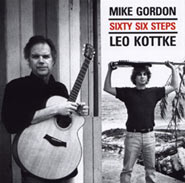Mike Gordon/Leo Kottke
Sixty Six Steps
(RCA)
I
was quite surprised when I read, about three years ago, of a soon-to-be-released
CD featuring tracks composed and jointly performed by Leo Kottke and
Mike Gordon: your typical "musicians' musicians" (sadly, an
endangered species in this day and age), both - each in his own way
- original figures in the US landscape. Maybe the last of the "modern
traditionalists", starting from the early 70s (an era when he also
recorded on John Fahey's label, Takoma) Kottke is one of the few "self-sufficient"
6- and 12-string acoustic guitar players whose work can be said to sound
traditional, but not tired or stale; he has a discography of respectable
size; while fans of Rickie Lee Jones fondly remember his playing on
Traffic From Paradise (1993). Quite popular on a mass scale, Mike Gordon
was for twenty years the bass player in Phish, one of the most successful
concert attractions of the 90s; his versatile, distinctive bass playing
style needs no introduction; while his love for country and bluegrass
is well-known; it was his love for this kind of music that made him
get in touch with Kottke - one of his favourite musicians ever - and
which ultimately produced their first collaborative CD, Clone.
Clone
didn't disappoint, proving to be a subtle and airy album (even though,
given the times, its appeal was by definition bound to be of the "highly
selective" kind). The two musicians managed to overcome the biggest
obstacle, i.e. how to integrate an individual bass style into a personal
finger-picking style without making things banal and without introducing
incongruous elements in the mix. After the agile opening track (Arko),
they showed they could easily find a nice balance: check Car Carrier
Blues, From Pizza Towers To Defeat, The Collins Missile, Disco, June,
Middle Of The Road, Whip. The only (and ultimately minor) problem became
apparent after repeated listening sessions: a few episodes sounded so
representative of each musician's individual dimension (Gordon: Clone
and Clay; Kottke: I Am A Lonesome Fugitive) as to sit a bit uneasily
among the rest, so demonstrating there was still work to be done if
the pair was to achieve a more fluid amalgam.
I'm
glad I can say that Sixty Six Steps shows the problem has been left
behind. It goes without saying that their identities are as easy to
recognize as their voices (Kottke's baritone, Gordon's thin, almost
hesitant style); but using a nice calypso (The Collins Missile) from
their previous album as their starting point, Gordon and Kottke have
given Sixty Six Steps a unifying musical theme that's a big part of
the album's considerable charm.
Rehearsed
in Costa Rica, recorded at the famous Compass Point Studios in Nassau,
Bahamas, the album makes good use of the fantastic percussive abilities
of Neil Symonette, always very agile and inventive in his use of tempos
and timbres - listen to his performance on the opening track, Living
In The Country; his rhythmic accents on Balloon; and to the almost-funky
Can't Hang. We also have three covers: besides the already mentioned,
Pete Seeger's-penned Living In The Country, we have (are you ready?):
Oh Well, Peter Green's hit single with (early) Fleetwood Mac (check
Then Play On, 1969); and Aerosmith's mega-hit, Sweet Emotion; both very
good, with intricate arrangements.
Gordon offers nice songs such as The Grid and The Stolen Quiet; also
the country-sounding Over The Dam and the uptempo Can't Hang, both of
which wouldn't have sounded out of place on an album by Phish (such
as Billy Breathes); from Phish's live repertory comes the famous Ya
Mar. Besides the already-mentioned covers, Kottke sings Rings and Balloon,
plays a nice slide on From Spink To Correctionville and generally proves
himself to be perfectly at ease playing besides such a lively percussionist
(if I'm not mistaken, this is a first for Kottke).
I could say more, but I really believe Sixty Six Steps to be one of those
records that each listener will have a lot of pleasure discovering on
his/her own.
Beppe Colli
© Beppe Colli 2005
CloudsandClocks.net | Sept. 19, 2005











